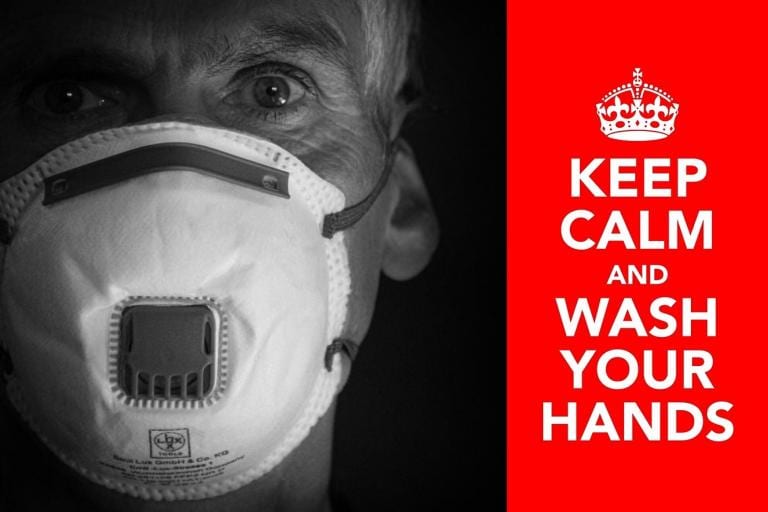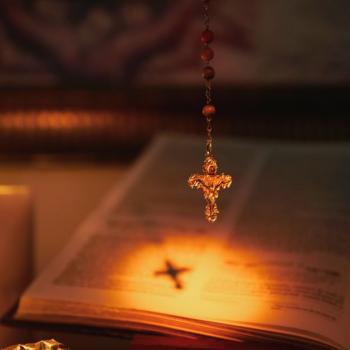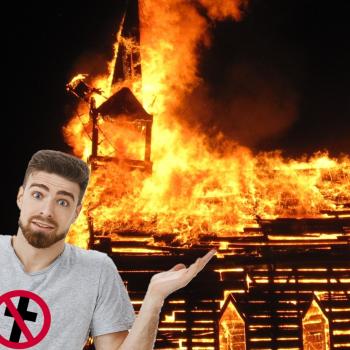 Image credit: pixabay.com
Image credit: pixabay.com“For God hath not given us the spirit of fear; but of power, and of love, and of a sound mind.” — 2 Timothy 1:7 KJV
In the wake of any traumatic event or disaster, emotions usually run high among those involved. In my own experiences, I’ve had my own share of vehicle accidents where, in the aftermath, my head was usually overloading with questions. What if I had gone a bit slower? What if I took an alternate route? What if I had paid more attention? What if I had left earlier? Yet no amount of pondering the what-ifs could change the reality of the circumstances. Similarly, when it comes to events that affect us on a larger scale, it’s easy to sift through the ‘what-ifs.’ I think it’s all part of the stages of grief that we humans naturally endure. First you have the initial shock and realization of the situation, which is usually paired with denial. This is usually followed by guilt or anger over the situation because it is beyond anyone’s control. Then comes bargaining, then depression and finally acceptance.
The behavioral patterns of people are an interesting sight to behold. Humans are habitual creatures and are stubborn as hell. We cling to what makes us comfortable and we don’t like our routines to be changed. When these comforts are suddenly removed it leaves us kicking and screaming in withdrawal — hence the initial stages of grief. It’s easy to get stuck in ourselves and point the blame on something in order to validate our feelings of grief. In the case of my vehicle accidents, I remember thinking that the driver(s) who hit me should have seen me and stopped sooner, even when I was clearly the one at fault. This would be a prime example of responding out of anger. Similarly, some the reactions I’ve seen from people on social media tend to give an apocalyptic vibe as though there were an even larger scheme at work.
In the case of the COVID-19 outbreak, the American and Canadian governments under the advice of scientists and healthcare professionals have advised the general public to take extreme precautions to counter the spread of the virus. Precautions which involve constantly washing our hands, sanitizing high-traffic surfaces, maintaining a safe distance while in public or (in the most extreme cases) isolating oneself at home. For many people, the feeling of being restricted or confined is a sheer discomfort within itself, if not degrading. Some were distraught at the notion that activities they were once free to do publicly were no longer a right, though the very act could risk spreading infection to those who are vulnerable.
In response to this, I’ve noticed many people theorizing that the virus was a bio-weapon made by China, or that the threat of the virus is benign compared to other diseases and is a chance for governments around the world to manipulate the media in order to enforce so-called medical martial law — therefore further suppressing human freedoms as the world supposedly evolves into a globalist state. For some Christians, it’s easy to draw parallels between current events, speculative end-time theories and dystopian fiction. Some have even gone as far as saying the viral outbreak is a satanic plot to suppress religious freedoms in order to accomplish a New World Order. This is nothing new because throughout history, especially during times of war, famine, pestilence or death, people would sometimes convince themselves that the apocalypse was near because these things are represented by the four horsemen in the Book of Revelation. But just because these cataclysmic events are associated with the end times, it does not mean we are living in the last days. As Scripture reveals:
“And you will hear of wars and rumors of wars; see that you are not alarmed; for this must take place, but the end is not yet. For nation will rise against nation, and kingdom against kingdom, and there will be famines and earthquakes in various places: all this is but the beginning of the sufferings.” — Matthew 24:6-8 RSV
When people are accustomed to freedoms we normally enjoyed during economic prosperity, they cling to them for dear life on what they have left of that comfort. Because of the way the government is responding to the COVID-19 outbreak in a way that hasn’t been seen in recent history, people are scared all around. People are worried about contracting the virus, getting sick and possibly passing it along to friends and family. They’re afraid of losing their jobs, their homes, their financial security, their ability to maintain basic needs like food, water, clothing and shelter. People are afraid of dying. And I will say being afraid is a natural human response to uncertainty. These are valid things to worry about. I think every person on earth craves control of some form, and that it takes a certain level of self-awareness to recognize the things we have little to no control over in order to rise above our circumstances. But I also wonder if some of these fearful responses could be the symptoms of a culture that needs to detoxify itself from crony capitalism and the mindset of looking out for number one?
I think there’s a natural inclination for humans to resist authority. As a Catholic, even though I willingly submit to authority of the Bible and the Church, I can attest to the fact that sometimes I feel like there are a million things I’d rather be doing than praying, reading my Bible, going to Mass, or simply obeying the tenets of Christian morality. People in general often abhor institutions because they exist to exercise a certain degree of control over people — or simply suggest control at the very least. When a board of nutritionists suggest eating more fruits and vegetables as opposed to meats and sugars, some people tend to resist and do the opposite. I sometimes do this myself without realizing it. And when their health eventually deteriorates due to their own choices in how they treated their own bodies, some will act as though the consequences of their actions were undue and unjust. Similarly, people are quick to throw blame on governments or prominent leaders for either falling short, completely failing them or deliberately being complicit to the disasters at hand. Some blame Donald Trump for being responsible for the outbreak in the United States while others will blame China for the virus getting out of hand. Even in the Catholic community, some have speculated that Pope Francis is somehow responsible for the spread of the COVID-19 virus. The truth is, these are easy targets, and throwing baseless accusations and appealing to subjective neo-prophetism fosters a culture of fear that neither changes the fact that this situation is likely a chain of events and a collective fault; nor does it contribute to any objectivity in finding a solution to the problem at hand.
What also comes to my mind is a scene from the Ridley Scott film Kingdom of Heaven in which the main protagonist starts to burn the bodies of the dead after the siege of Jerusalem. Because burning bodies goes against the belief that they will not be resurrected in the Second Coming of Christ, the priests objected to it. To which he states that everyone in the city will die of disease if the bodies are not burned. He then proclaims, “If God does not understand, then he is not God!” When put into this perspective, the threat of COVID-19 could be a result of people who were collectively unwilling to do their part in preventing the spread of infection such as proper washing of hands, maintaining a healthy social distance or just staying home altogether. In which case, the widespread cancellation of public worship services is one of those difficult situations where Christians are forced to choose one obligation over another: either uphold a holy day of obligation or avoid being complicit to the mortality rates of a viral disease. I think this raises more questions of the ethics of religious practices in the midst of disaster, and presents an opportunity for religious leaders to get creative in keeping their community traditions alive while still respecting the methods of alleviating the spread of infection. Additionally, I think the passage in the New Testament when Jesus heals a man on the Sabbath day is also worth reflecting upon:
“Again he entered the synagogue, and a man was there who had a withered hand. And they watched him, to see whether he would heal him on the sabbath, so that they might accuse him. And he said to the man who had the withered hand, “Come here.” And he said to them, “Is it lawful on the sabbath to do good or to do harm, to save life or to kill?” But they were silent. And he looked around at them with anger, grieved at their hardness of heart, and said to the man, “Stretch out your hand.” He stretched it out, and his hand was restored. The Pharisees went out, and immediately held counsel with the Hero′di-ans against him, how to destroy him.”
— Mark 3:1-6 RSV
I think it’s also worth pointing out that the stress of dealing with the socioeconomic effects of the COVID-19 outbreak also increases the risk of mental health and domestic abuse cases. I think an emphasis on healthy coping skills, managing stress and an openness on struggles with anxiety and depression has never been more important in the history of our nation. During the Second World War, measures were put in place to encourage people to focus on their daily routines and being positive. This is why wartime posters with phrases like, “Keep calm and carry on,” were a common sight back then. Entertainers such as Bing Crosby and Canadian radio show The Happy Gang were regarded as a source of comfort among many North Americans. With their corny jokes, humorous skits, upbeat musical numbers and all-around wholesome entertainment, they brought much-needed cheer to the working class and for military fighting overseas. When emotions run high due to an impending threat of invasion, maintaining a level of positive morale was important to help society continue functioning, press forward and look towards a brighter future. Nowadays, we have streaming entertainment services capitalizing on the widespread fear of the virus by promoting films like Pandemic and Contagion – which, unfortunately, is not making the situation any better. In light of this, I think controlling what we expose our minds to (whether it be news articles, radio, film and television) plays a significant role in our ability to manage our mental health in these times of uncertainty.
There are far too many people on this earth who are looking out for themselves for any conspiracy theories to be remotely accurate. If we spend more time worrying about what is to come as opposed to cooperating with one another to help rise above the circumstances, are we even living? Whenever uncertain times are upon us, it requires a level of faith, hope and acceptance. Faith that life will still carry on, hope that God will guide the hands of workers, healthcare professionals, scientists and government officials to help alleviate the spread of COVID-19, and that He will help us meet our basic needs. And additionally, accepting that things will happen that are beyond our control. Most importantly, how we love one another in times of crisis will be the deciding factor of what kind of people we will become as we come out of this pandemic.
“Therefore do not be anxious about tomorrow, for tomorrow will be anxious for itself. Let the day’s own trouble be sufficient for the day.” — Matthew 6:34 RSV
















